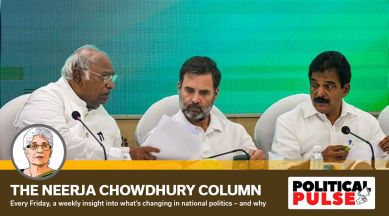After the slip, the nuance: Congress does a rethink on Israel resolution, condemns Hamas
Days after CWC resolution was silent on Hamas or its terror attack, party says: “The Congress unequivocally condemns the attack on the innocent civilians of Israel by Hamas."

As the conflict between Israel and Hamas intensifies and the horrifying scale of the October 7 attack on civilians emerges, there is growing disquiet in a section of the Congress about the working committee (CWC) resolution from earlier this week that did not mention Hamas or condemn the terror attack.
In fact, the first step towards what can be seen as a course correction has come. Sources in the party said how the resolution, first reported by The Indian Express, came to be issued was now being “investigated” and there was a move towards taking a more nuanced position closer to the one taken by the party’s communications chief Jairam Ramesh.
Without referring to the CWC resolution, or Ramesh’s comments, Congress spokesperson Pavan Khera late on Friday told The Indian Express, “The Congress unequivocally condemns the attack on the innocent civilians of Israel by Hamas.”
Khera’s statement went beyond Ramesh’s formulation that had condemned the “brutal attacks” on Israelis but without naming Hamas as the perpetrators. And it was much stronger than the CWC resolution that had been silent about Hamas or its terror attack on Israel. “We have always believed,” Khera continued, “that the legitimate aspirations of the people of Palestine for a life of self-respect, equality and dignity can only be fulfilled through a process of dialogue and negotiations ensuring national security for the people of Israel.”
With Khera’s words, the Congress has come out with three statements on the war in a week, showing the differences within that it has tried to synthesise. Former Union Home Minister P Chidambaram, however, felt that both the statements — Ramesh and the CWC resolution — should be “read together” and both sides must stop the violence. He said it was the BJP that had changed its position, first by supporting Israel and then talking about the rights of the Palestinians.
Talking to four senior Congress leaders, it became evident that after the conflict was discussed in the CWC, a brief resolution was drafted and amendments made before being distributed among the members of the body. To get around the differences on the issue, Congress president Mallikarjun Kharge decided the resolution would not be passed, saying the CWC should stick to discussing the demand for a caste census. “There was even a thumping of desks at this (welcoming Kharge’s decision). Rahul Gandhi also thumped the table agreeing with this decision,” said a senior leader.
Another senior Congress functionary said the resolution was not supposed to be made public, admitting, “We don’t know how it happened, and who did it.” While some Congress leaders acknowledged that “it (the CWC resolution) did not represent the prevalent view, some mischief was done and the resolution was released”, others labelled it a faux pas.
“Mistake or mischief, that (not condemning Hamas) is not our stand,” said a senior Congress leader. “A terror attack is a terror attack. There is no way the party can condone an attack on civilians.”
It was Ramesh who first took a nuanced position on behalf of the party. He condemned the “brutal attacks on the people of Israel” while reasserting India’s support for the “legitimate aspirations of the Palestinian people for a life of self-respect, equality and dignity”. Significantly, he was also not critical of Prime Minister Narendra Modi’s statement that India stands with Israel at its most difficult moment. This represented a change in the Congress’s position. In the recent past, the party has criticised the government for supporting Israel at the cost of Palestinians.
Changing India-Israel ties
As geopolitical realities changed over the years and India’s relationship with Israel, and the US, deepened, the Congress position underwent a subtle shift. It was Prime Minister P V Narasimha Rao of the Congress who first established diplomatic ties with Israel in 1992 and announced it while Palestine Liberation Organisation (PLO) leader Yasser Arafat was in India (Rao had taken Arafat into confidence).
Under Narendra Modi, the relationship reached a new level. The I2U2 group — a grouping of India, Israel, the US, and the UAE that is sometimes called the West Asian Quad — and the recently forged IMEC (the India-Middle East-Europe) Economic Corridor are signs of this change.
But one thing is clear. Both the BJP and the Congress need to resist the temptation of using this conflict for their politics — either the Congress glossing over Hamas’s attack or the BJP equating the militant group with Islam and terrorism. For, Hamas cannot be equated with ordinary Palestinians, who deserve better. No matter how great the provocation, Israel too will also need to exercise restraint. Otherwise, the efforts for a peaceful resolution of this complex conflict will be set back by generations.
The Congress’s course correction on Friday is not just a case of “der aaye durust aaye (better late than never)”. It also brings both the ruling party and the main Opposition party on the same page after a very long time. While there may not be a consensus on the issue within the Congress, there is a consensus on the issue between the Congress and the BJP, for a change.
(Neerja Chowdhury, Contributing Editor, The Indian Express, has covered the last 10 Lok Sabha elections. She is the author of How Prime Ministers Decide)